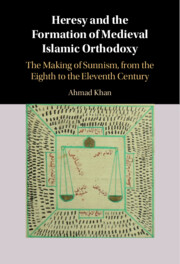 Heresy and the Formation of Medieval Islamic Orthodoxy
Heresy and the Formation of Medieval Islamic Orthodoxy Book contents
- Heresy and the Formation of Medieval Islamic Orthodoxy
- Heresy and the Formation of Medieval Islamic Orthodoxy
- Copyright page
- Dedication
- Contents
- Figures and Tables
- Preface
- Acknowledgements
- Notes on the Text
- Part I History of Orthodoxy
- Part II Heresy and Society
- 4 Regionalism and Topographies of Heresy
- 5 Ethnogenesis and Heresy
- 6 Politics: Rebellion and Heresy
- 7 Religion and Society
- Part III Unmaking Heresy: Orthodoxy as History Writing
- Part IV The Formation of Classical Sunnism
- Bibliography
- Index
6 - Politics: Rebellion and Heresy
from Part II - Heresy and Society
Published online by Cambridge University Press: 06 April 2023
- Heresy and the Formation of Medieval Islamic Orthodoxy
- Heresy and the Formation of Medieval Islamic Orthodoxy
- Copyright page
- Dedication
- Contents
- Figures and Tables
- Preface
- Acknowledgements
- Notes on the Text
- Part I History of Orthodoxy
- Part II Heresy and Society
- 4 Regionalism and Topographies of Heresy
- 5 Ethnogenesis and Heresy
- 6 Politics: Rebellion and Heresy
- 7 Religion and Society
- Part III Unmaking Heresy: Orthodoxy as History Writing
- Part IV The Formation of Classical Sunnism
- Bibliography
- Index
Summary
This chapter makes the case that Abu Hanifa’s relationship to politics and rulers was a key catalyst for the rise of discourses of heresy against him and, perhaps, the most consequential. Abu Hanifa’s alleged involvement with three rebellions flew in the face of a basic tenet of proto-Sunni traditionalist orthodoxy, namely, political quietism. It shows that politics and the state were implicated in evolving conceptions of orthodoxy and heresy, and how the growth of proto-Sunni traditionalism was in some ways fostered by political elites and representatives of the state.
Keywords
- Type
- Chapter
- Information
- Heresy and the Formation of Medieval Islamic OrthodoxyThe Making of Sunnism, from the Eighth to the Eleventh Century, pp. 184 - 205Publisher: Cambridge University PressPrint publication year: 2023
